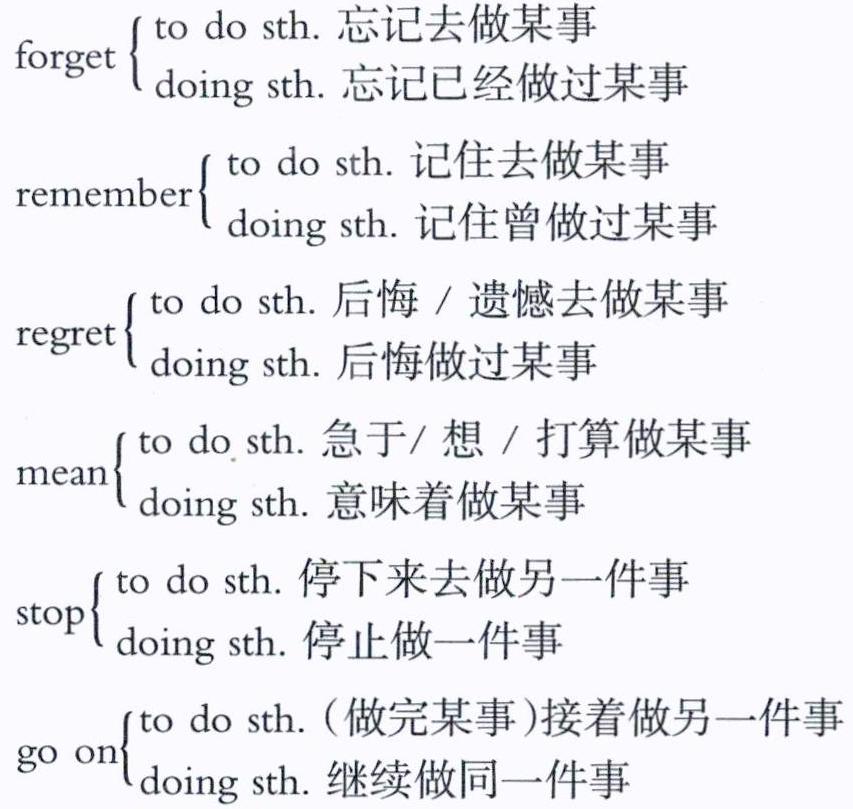浅析非谓语动词在高考题中的命题热点
2020-10-29张维红
张维红

非谓语动词包括不定式、分词、动名词。它们无人称和数的变化。纵观近几年全国各地的高考题,对非谓语动词的考查随处可见。如在选择填空、完形填空、阅读理解、短文改错中都有所考查。因此它既是重要的考点,又是广大考生为之头疼的难点。本文结合例题对非谓语动词的一些命题热点进行归纳总结,希望对同学们有所帮助。
一、逻辑主语要一致
这主要体现在非谓语动词作状语。动词不定式可作状语,表示目的、结果、条件等;分词作状语是用来说明主语的一个次要动作,表示时间、原因、条件、方式、伴随等,分词的逻辑主语应与主句的主语一致。现在分词多表示主语正在进行的动作,逻辑上为主动关系;过去分词则表示动作已经结束,与句子主语逻辑上为被动关系。
例题再现:
1. “We can't go out in this weather,” said Bob, ____ out of the
window.
A. looking B. to look C. looked D. having looked
解析:此题中非谓语动词look与主语Bob邏辑上为主动关系,表伴随状态。又因为其所表动作和主句谓语动词said 同时发生。故选A。
2. When first ____ to the market, these products enjoyed great success.
A. introducing B. introduced
C. introduce D. being introduced
解析:句中的introduce的逻辑主语是products;且products和introduce之间是被动关系,所以用过去分词。故选B。
3. It was unbelievable that the fans waited outside the gym for three hours just ___ a look at the sports stars.
A. had B. having C. to have D. have
解析:本题考查不定式作目的状语的用法。故选C。
二、分清时态很重要,主动被动要搞清
现在分词doing有being done (被动式); having done (完成式); having been done (完成被动式)三种形式。
不定式to do有to be done (被动式); to have done (完成式); to be doing (进行式)三种形式。
动名词doing有having done (完成式); being done (被动式)两种形式。
例题再现:
1. I don't know whether you happen ___, but I'm going to study in the U.S.A. this September.
A. to be heard B. to be hearing
C. to hear D. to have heard
解析: happen to do sth. 意为“碰巧做某事”,又因为非谓语动词的动作发生在know之前,故应用不定式的完成式。故选D。
2. The flu is believed ____ by viruses that like to reproduce in the cells inside the human nose and throat.
A. causing B. being caused
C. to be caused D. to have caused
解析: sth. is believed / considered / thought to be / as sth. 是英语中一种常见句式。又由by可知主语与谓语动词之间为被动关系。故选C。
3. ____ in the queue for half an hour, Tom suddenly realized that he had left his wallet at home.
A. To wait B. Have waited
C. Having waited D. To have waited
解析:本题考查非谓语动词作状语。先排除B,因为B项谓语动词形式明显不符合语法结构。由于题干中两个动作的先后关系十分明确,故选用分词的完成式作时间状语。故选C。
4. ____ from other continents for millions of years, Australia has many plants and animals not found in any other country in the world.
A. Being separated
B. Having separated
C. Having been separated
D. To be separated
解析:动作发生在主句谓语动词之前时用完成式;Australia 与separate之间为被动关系,所以要用完成被动式。故选C。
三、否定形式要记牢
非谓语动词的否定形式为:not + 非谓语动词,但在实际运用时,有很多同学容易用错,尤其是在非谓语动词的完成形式中,考生易受现在完成时的影响而误选。
例题再现:
1. ____ the programme, they have to stay there for another two weeks.
A. Not completing
B. Not completed
C. Not having completed
D. Having not completed
解析:“他们没有完成那项计划,只好再在那儿呆两周。”选C。Not having completed相当于 Because they haven't completed the programme。本题应特别注意not的位置,不要误选为D。
2. Tony was very unhappy for ____ to
the party.
A. having not been invited
B. not having invited
C. having not invited
D. not having been invited
解析:invite与主语为被动关系,又发生在谓语动词之前。故选D。
四、动词用法是重点,固定搭配不能忘
因为动词是构成句子的桥梁和纽带,考查重要动词的用法是高考的一个重点。而这些动词后跟宾语时,又有其特殊性,有的只能跟不定式,有的只能跟动名词,而有的两者皆可用,但意义大相径庭。现简要列举一些:
1. 不定式作宾语时往往跟在某些及物动词后面,常见的有:afford, agree, ask, decide,desire, expect, fail, hope, pretend, plan, intend, refuse等等。
2. 以下动词或动词词组后接非谓语动词时,通常只接动名词作宾语:allow, permit, appreciate, avoid, consider, delay, enjoy, escape, finish, imagine, miss, practise, resist, risk, be used to (习惯于), can't help (禁不住), can't stand, give up, feel like, keep on, insist on, look forward to, devote to, stick to, have difficulty (trouble) in, have a good / wonderful / hard time in等等。
3. 下列动词既可以跟动名词作宾语也可以跟不定式作宾语,但意义不同,须特别注意。
例题再现:
1. I really appreciate ____ to relax with you on this nice island.
A. to have had time
B. having time
C. to have time D. to having time
解析:本题为固定搭配,appreciate doing sth.。故选B。
2. Having been ill in bed for nearly a month, he had a hard time ____ the exam.
A. pass B. to pass
C. passed D. passing
解析:have a hard time / difficulty / trouble... (in) doing sth. “做某事很困难”。故选D。
五、非谓语动词作宾语补足语
在see, hear, watch, feel, observe, have, listen to, notice 等动词后,既可以用现在分词构成复合宾语,也可以用省略to的不定式构成复合宾语,但两者的含义是有差别的:用现在分词时表示动作正在发生(即处于发生的过程中,还没有结束);用省略to的不定式时表示动作发生了(即動作全过程结束了)。在这里大家还应注意与分词作定语形式的区别。
例题再现:
1. a) The __ _ boy was last seen _ __
near the East Lake.
A. missing; playing
B. missing; play
C. missed; played
D. missed; to play
b) My advisor encouraged ____ a summer course to improve my writing skills.
A. for me taking B. me taking
C. for me to take D. me to take
解析:a)中missing是形容词作定语;see sb. doing,现在分词作宾语补足语。b)中encourage sb. to do sth.,不定式作宾语补足语。答案为a) A b) D。
2. a) He looked around and caught a man
___ his hand into the pocket of a
passenger.
A. put B. to be putting
C. to put D. putting
b) The flowers ____ sweet in the botanic garden attract the visitors to the beauty of nature.
A. to smell B. smelling
C. smelt D. to be smelt
解析:a) 中catch sb. doing sth.“正巧碰到或抓住某人做某事”,用现在分词表示动作正在发生,作宾语补足语。b) 中smelling sweet 是现在分词作定语相当于一个定语从句which smell sweet。故答案为a) D b) B。
